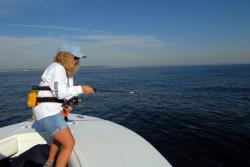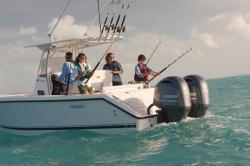Introducing Women to Saltwater Fishing
from The Fishing Wire
So your wife, girlfriend or daughter wants to try fishing? How you handle her initial experience can make all the difference.
“Daddy, take me fishing,” are four words any fishing father loves to hear from his son, but it has become a more common refrain from daughters-and it’s just as welcomed. In fact, it’s not just daughters showing a greater interest in the sport, but women across the spectrum. That’s a great thing! While fishing is still a male-dominated sport, there has been a steady increase in the number of women fishing alongside men, and a new breed of distaff anglers who get out there and do it on their own.
Tangling with a big striper takes skills for success, and both men and women need a bit of instruction before they hook up the first time on a fish this size.How you manage any newcomer’s introduction to fishing will have an effect on their perception of the sport and their desire to become more involved. With that in mind, there is no one better to consult on this subject than Betty Bauman, founder and CEO of Ladies Let’s Go Fishing (LLFG).
Betty started fishing as a child and shares a deep love of the sport. Throughout her fishing experiences, she has moved from cane poles and ponds to saltwater. The knowledge and skill she has acquired along the way, combined with her winning marketing skills and outgoing personality, have helped her share her passion for fishing with other women interested in getting started in the sport. Her award-winning seminar series, which she affectionately calls the “no-yelling school of fishing,” has successfully introduced over 5,000 women to saltwater fishing.
“As an experienced angler, the first thing you have to realize is that fishing is not simple,” said Bauman. “You can’t just throw someone into a fishing situation without first spending time talking, demonstrating and providing them the opportunity to practice a little.”
There is nothing more frustrating than putting a rod and reel in the hands of someone who has never fished before, expecting them to be able to use it on the water. For an experienced angler, the tools of the trade might be old hat. But for someone who has never fished before, something as simple as operating a reel or feeling a bite can be challenging. If you don’t alleviate the potential for frustration from the beginning, novice anglers simply won’t have a good time. And if he or she doesn’t enjoy the initial experience, chances are unlikely you will gain a new fishing buddy.
Saltwater fishing is a different ballgame from freshwater, requiring bigger boats, motors and tackle-but it’s at least equally fascinating with a good teacher or two.Betty explained that it’s important for the experienced angler to become a teacher. Stop and think about why you go fishing and convey that message as clearly as you can.
“You have to explain the whole world of magic that emerges when you’re fishing, and do your best to paint a picture of that magic before she sets foot on a boat,” she advised.
Tell her about the fish you plan to catch, and show her pictures of them. Tell her about the habitat they live in, what they eat, and how you plan to fish for them. Let her know there is so much more to fishing than the act of fishing itself. There will be opportunities to commune with a wide range of sea life; birds, porpoises, sea turtles and hundreds of species of fish, while you’re out on the water. It broadens the experience and takes some of the emphasis off catching fish.
Spend a little time explaining the various techniques: trolling, casting, jigging, bottom fishing. Don’t just show her a lure or a bait rig and tell her this is what we are going to use. Explain how it works and how to use it. She won’t remember everything – no one can. (You didn’t in the beginning either.) But that’s not important first time out; it’s just a good way of showing her that fishing, like any sport, isn’t as easy as it might look. It requires some education and experience to become proficient.
The time for instruction is before you actually get on the boat to go fishing. Teach her about the tackle you plan on using for her first on-water experience, and let her handle it. Show her how to operate the reel, and explain how it works in conjunction with the rod, not just as a casting tool, but as a fish fighting tool. Explain the principle of the drag system and how it comes into play to prevent the line from breaking when a large fish is hooked.
Giant stripers like this one don’t come along every day, but when they do, any angler can truly appreciate them.If you’re using spinning tackle, explain the importance of not reeling when a fish is pulling line off the reel. Teach her how to use the rod to lift and retrieve when fighting a fish. If she will be casting on her first outing, show her how so she understands the basic principles. You should include a practice session with you standing by as her mentor ready with words of encouragement and suggestions on how she can improve when she is doing something wrong. No matter what happens stay cool, keep positive and make the learning experience as pleasant as you possibly can. According to Betty the two most important words to use at times like these, no matter what happens, are “It’s OK.”
If she is not familiar with the boat and how to fish from it, there is that much more to explain. You can also explain how to control a fish at boatside, whether it is to be netted, gaffed or released. Tell her why a lot of fish are released either voluntarily or because of regulations. And be sure to cover the importance of wearing appropriate clothing so she is comfortable for her first fishing experience. Clothing will vary depending on where you are fishing and the time of year, but it is an important topic. Be sure she brings sunglasses and sunscreen, and if there is any chance she might have a predilection for seasickness, simple over-the-counter remedies are cheap insurance for a nice day on the water.
Plan her first fishing experience to appeal to her, not you. Pick a target species that is abundant, easy to find and requires simple skills to catch. Consider keeping the time on the water brief instead of forcing her to get up at sunrise and drag herself back after a ten-hour day on the water.
The most important thing for any newcomer to the sport isn’t catching a big fish or great quantities of fish, it’s catching a fish – period. For that reason, you might consider a morning or afternoon of bottom fishing with simple bait rigs that don’t require a lot of casting. Pick a nice day, anchor on a productive spot, bait her hook, have her drop it to the bottom. Explain what a bite feels like and how to set the hook when she feels one. All she has to do is catch a fish or two, and you’re well on your way to fulfilling all her initial expectations of fishing. From there it’s a matter of moving forward at a pace that is comfortable for her, and seeing how her interest grows. You might be surprised when she starts asking you to teach her more and mentions trying different types of fishing for different species of fish. After all, it is the most addictive of sports whether you’re a man, woman or child.
If you’d like to learn more about Betty Bauman and her educational seminars for women go to www.ladiesletsgofishing.com.


